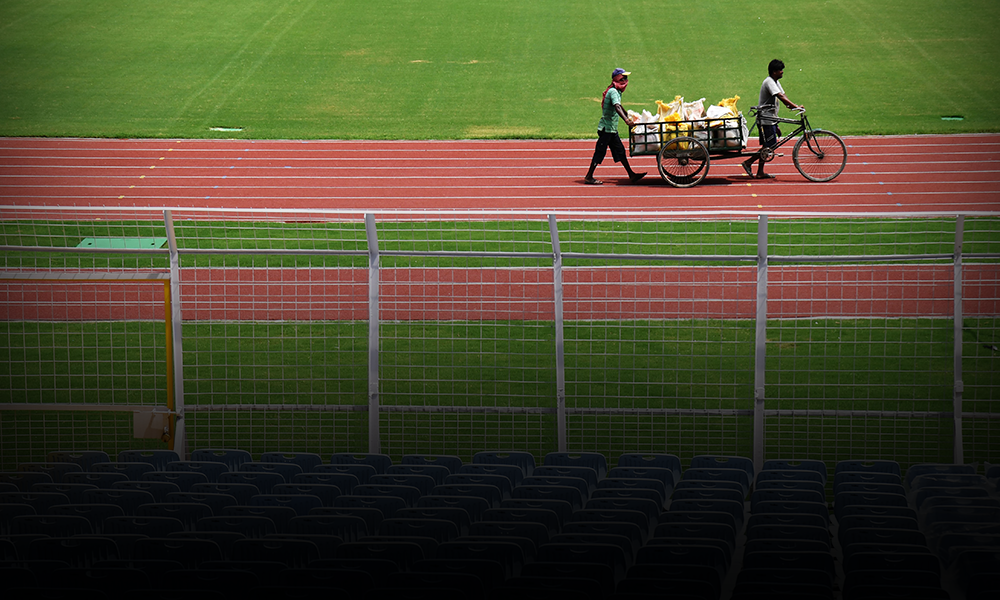Vishal Patel writes about some depressing developments taking place in connection with the upcoming U-17 World Cup in India.
For long, experts have wondered why countries like India and China simply do not rise up the footballing ladder. Theorists in books like Soccernomics have speculated that this may be down to causes like GDP, average height and so on. However, the lived experience of these countries points to yet another factor that the developed world fails to take into account- corruption and governmental interference.
The awarding of the upcoming FIFA U17 World Cup to India was greeted with much positivity by the community that loved the game here. It was seen as a step in the right direction for football in India. It was a great opportunity to build and improve infrastructure that could be used by future generations. Of course, stadiums have been renovated, and training facilities revamped. Now all that’s left is to add the gloss.
How will that be done? ‘Beautification’ is a sanitised word in developing countries, especially those with India’s population. It is often a euphemism for getting rid of the ‘classless’ and basically poor people in the area that needs to be affected. This is exactly what has been happening in Kolkata of late, in the vicinity of the iconic Salt Lake Stadium. As the preparations entered their final phase, government contractors began evicting slum dwellers, and shutting down local businesses. Of course, this process wasn’t carried out with all the due diligence that we would see in an ideal scenario, essentially leaving the most powerless sections of our society to fend for themselves against the collective might of the government backed corporate nexus.
In order to bring an element of balance to the equation, law students from a nearby college, working with the organisation Increasing Diversity by Increasing Access, managed to get a stay order from the Calcutta High Court, providing at least temporary relief to the 22 families who were set to be affected by these actions. A quick excavation of the links will give you an insight about the kind of conditions in which the families were being forced out. The legality of the eviction process was also ruled on by the court, and details are expressed in a clear and coherent manner by barandbench.com.
At this point, a few disclaimers bear stating. The writer of this article isn’t against beautification, or development in the slightest. As a football lover, it would be terrific to see infrastructure for the upcoming talent being put in place, and as a proud Indian, it would be equally gratifying to see a smooth show put on by our country. The point of this article isn’t to slag off the organisers of the event (who probably don’t even know about these developments) or the government for trying to whitewash the area around the ground. It is simply to bring to light the haphazard manner in which the process is being conducted.
The families in question have been living in there for over a decade (some as long as 3 decades). India was awarded the right to host this tournament in December 2013. The authorities had the better part of 4 years to plan for this tournament. Surely, that afforded them enough time to put in place an alternative plan to house the human beings from these slums. At the very least, it gave them the chance to put in place a compensation scheme of some variety, as opposed to the ad hoc and brutal approach that was finally employed.
While such occurrences are fairly routine for those of us from developing countries (a sad commentary in and of itself), the backlash to a legal and non-violent intervention is one that is downright shocking and scary. The protesting students, who presented the court order to the contractor in order to stop the demolition work at the slum, were “groped and brutally assaulted by a mob of goons”. The incident was even covered by leading local and national dailies, with publications like The Times of India, and The Telegraph reporting it. All of this happened in a well-known suburb of one of the largest cities of the world’s largest democracy.
Post this incident, the court stepped in and ordered rehabilitation of the slum dwellers within 24 hours, with further hearings scheduled for later this year. The proposed rehabilitation is to a makeshift location, with no access to resources like toilets and water (basic amenities crucial to survival). Their new ‘home’ has toilets which are located 1.5 km away. We can only understand the importance of these facts if we acknowledge the relevance of readily available water and toilets to slum dwellers. Their survival basically depends on access to such resources in their vicinity, because they obviously can’t afford indoor plumbing and other such facilities we take for granted. All this in light of the court order shown below.

What’s worse is, that for us football fans, this isn’t new. The ‘cleansing’ that took place in the favelas of Brazil in the lead up to the 2014 World Cup serve as another example of the arbitrary and unjust action in the name of football causing mass grief. I’m sure more eloquent and more knowledgeable observers will be able to add to this list, or hopefully even prove me wrong, and point these incidents out as outliers.
Why are you reading about the issues plaguing local politics in a part of the world very far away from where you live? Why do you care about a few whippersnappers getting a beating? Because you and I pay for this. Governments, organisers, and authorities in general are powerless without the monetary and financial backing of their sponsors, sponsors who get their money from us. We’re the ones who pay for streaming, replica kits, and pay attention, all for our fix of good football.
Again, the point of this article isn’t to demonise sport, tournaments, and festivity. This is very different from the content we usually publish here at Outside of the Boot, but it is an appeal for solidarity to the conscience of the global footballing community. The beautiful game is one that ultimately is a cause for great happiness, peace, and universal brotherhood, irrespective of club or national allegiances. As fans and supporters, we need to be aware of the atrocities committed in the good name of our beloved sport, and speak out against them.
- Analysis: Are Chelsea’s pressing issues a concern? - October 5, 2020
- Has Financial Fair Play Been Worth It? - August 27, 2020
- Tactical Philosophy: Frank Lampard - May 20, 2020
























































